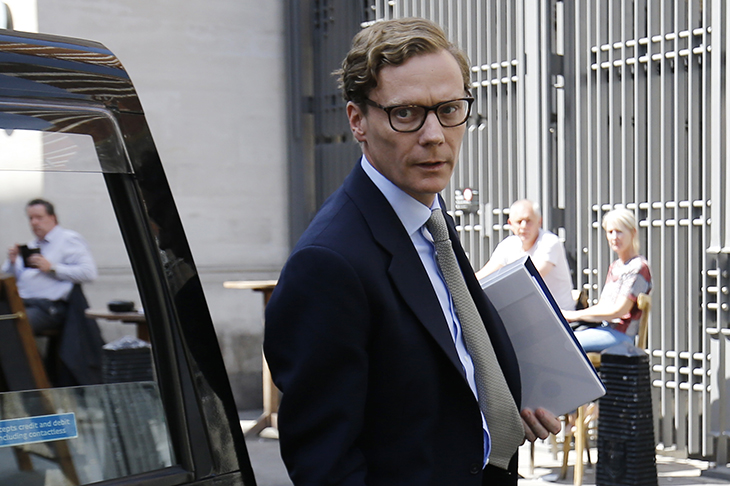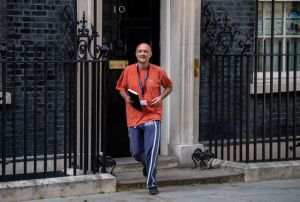If you have heard of Alexander Nix, you probably think he’s a villain. He is the former head of Cambridge Analytica, the data analytics company that helped Donald Trump win the presidential election. Nix and his colleagues have been accused of all sorts of other dastardly deeds: conniving with the Kremlin to hack democracy, ‘dark messaging’ people with racist ads on Facebook in the run-up to Brexit, and more and worse. Nix lost his job after a Channel 4 investigation into Cambridge Analytica in March last year — the exposé won a Bafta last weekend. By May, Cambridge Analytica and its parent company SCL had gone into administration, and Nix had been widely condemned as a Machiavellian crook.
A year has passed, and Nix is ready to talk. I meet him in the Ladbroke Arms, near his house in west London. He’s invariably described as an Old Etonian — the implication being that he’s a smooth creep. Like many OEs, however, Nix is in reality quite neurotic: sometimes charming, sometimes awkward. He orders chips — ‘Why not?’ — but doesn’t eat them. He fiddles with his coiffed hair and his car keys. He also stammers, often saying the same word three times over. He admits that as a child he had ‘an overabundance of energy and interest’, but he doesn’t want to talk about himself today. He wants to talk about what he calls ‘wrongs that need righting’.
Many of those wrongs, he says, can be traced to Christopher Wylie, the pink-haired whistle-blower who claimed SCL illicitly harvested Facebook data, then combined that with ‘psychographics’, psychological marketing techniques, to tap into people’s darkest (read: racist) fears in order to make them vote for the twin evils of Trump and Brexit.
The allegations were, at the time, sensational enough to cause alarm at the highest levels of politics. There were inquiries from the US Department of Justice, the FBI, the Federal Elections Committee, the UK Department for Digital, Culture, Media and Sport, the Information Commissioner’s Office, and even the National Crime Agency. Cambridge Analytica was put into administration and forced to pay relatively small fines for procedural errors, but the company has not been found to have committed any real crime.
So no smoking gun, but what about the dark art of psychographics? Nix describes as ‘absolute nonsense’ the idea that ‘if you apply this word “psycho-graphics” you can mindbend people’.
‘The idea of applying psychology or behavioral sciences to communication is not a new one,’ he goes on. ‘It’s very old behavioral economics. If it gives you some additional insights — so be it. But it is not like you’re hoodwinking millions of people into buying more toothpaste because you realize their favorite color was red.’
Besides, he adds, the ‘personality type’ algorithm that Cambridge Analytica employed was not all that effective. ‘It was an experiment. It didn’t yield the results we were looking for and we abandoned it pretty early on. So for us this great furore over the use of this data was never quite as obvious. This data hadn’t been used with great effect to achieve anything.’ Still, at the time many people were more than willing to believe that psychographics worked. That suited Nix when it involved selling his company’s services. In September 2016, with the Trump campaign in full swing, he gave an address to the Concordia Summit in New York entitled ‘the power of big data and psychographics’. He talked about how his company’s psychological profiling techniques were revolutionizing political campaigning.
Was he hyping something that didn’t actually work? ‘I wasn’t mis-selling,’ he says, somewhat evasively, adding that his company had always approached marketing through a combination of ‘big data and psychology’.
Whatever the truth, it seems a bit much to suggest — as a great many people have — that Cambridge Analytica and similar firms somehow mind-hacked the American and British electorates. Nix says that using the company was effective for Trump: ‘Like it or not, this was a data–driven election that Trump ran. He spent around $120 million on digital. Every single dollar was placed by my team or Cambridge employees. The data was being used to inform important questions about what to message, what to say, where to hold rallies and who to target.’
Contrary to popular belief, Nix’s company was never contracted to work on Brexit. He did talk to Arron Banks, the self-styled ‘bad boy of Brexit’ and others behind the Leave.EU campaign group; and at one stage a colleague of Nix’s, Brittany Kaiser, appeared alongside Banks as he and Nigel Farage pushed for Leave.EU to become the official campaign group — but the two groups never formally worked together, as the government’s inquiries later confirmed.
That didn’t stop Banks and his associate Andy Wigmore bragging about the Cambridge Analytica whizzbangery they were able to harness. Nix says that ‘the strategy of Banks and co. was to dangle a rather lucrative contract in front of us and then seek to leverage their association with us — this sort of semi-renowned political consultancy firm — to give weight to their campaign to become the designated referendum outfit’. Instead of actually employing Cambridge Analytica, Banks set up his own data company, Big Data Dolphins (nobody can accuse him of lacking a sense of humor) and tried to replicate Cambridge’s techniques. Elizabeth Denham, the UK Information Commissioner, has said that Banks’s group showed ‘a disturbing disregard for voters’ personal privacy’ and has threatened them with a £130,000 fine.
What is odd is that after Trump’s victory, Banks’s associates were still talking about Cambridge Analytica. ‘I can only assume that it was some sort of swanking — they wanted to be associated with the Trump thing.’
So if there was no secret digital weapon, and no real involvement in Brexit, why did so many believe otherwise?
The answer to that question takes us back to the pink-haired Christopher Wylie. The Observer (which led much of the coverage) described Wylie as a ‘founder’ of Cambridge Analytica: ‘the data scientist who came in from the cold.’ But according to Nix, Wylie was ‘an intern who worked two days a week whilst doing a fashion degree’. ‘He’s not a data scientist,’ Nix says. ‘It’s just bonkers what he’s saying.’
After falling out with Cambridge, Wylie quit to set up a rival venture, Eunoia Technologies. Nix says: ‘He pitched all our clients. We sued him and put him out of business. And this was his retribution.’
Wylie is now a consultant for the fashion brand H&M and flies around the world making speeches about the internet. Sometimes whistleblowing pays.
Nix dresses like a Euro playboy in relaxation mode — tight white chinos, blue V-neck. But he is married ‘very happily’ to Olympia Paus, a Norwegian shipping heiress; they have three children.
He doesn’t appreciate certain lines of questioning and has a Tony Blair-like habit of starting difficult answers with ‘Look…’. He’s uncomfortable when asked about the Channel 4 documentary, which filmed him boasting about the dirty tricks SCL could perform, such as sending Ukrainian ‘girls’ to lure opponents into scandal, or offering bribes. ‘There was no need for me to use such fanciful hyperbole and hypotheticals,’ he says. ‘But the way they edited that interview was deliberately contrived to do the maximum harm to a company that they’d already decided was guilty of Brexit.’
It wasn’t just fantasy, though. SCL did conduct a sting operation against Lindsay Grant, a politician in St Kitts & Nevis. They filmed themselves offering Grant a million-dollar bribe, which he duly accepted. SCL then circulated the video on the internet. ‘At the time, it seemed like the right thing to do,’ says Nix. ‘A lot of people in the country knew that this politician was deeply corrupt and I think we felt this needed to be brought to light — maybe slightly naively.’
Did he ever think he had crossed a moral line? ‘Never. The work we did just wasn’t like that.’ Did he ever get the impression that the politicians he worked for were corrupt? ‘No, actually.’ What really sank Cambridge, he says, was a ‘perfect storm’ of factors. On the one hand, ‘the polarizing nature of Trump and Brexit and the desire to find someone to blame for that’. On the other, ‘a sort of mass epiphany’ that big tech companies were making money out of everybody’s data.
‘Add to that,’ he continues, ‘a trove of allegations by a disgruntled former employee about this shadowy company that operates nefariously around the world, and you begin to see why the story attracted so much attention.’
Following that ‘epiphany’ about data, the media’s ire has moved on to Facebook and its founder, Mark Zuckerberg. After all, Facebook knows so much about so many of us. There was nothing illegal about the way Cambridge Analytica captured data from people’s Facebook profiles: the company employed a widely used application that enabled businesses to target people’s friends through the network.
President Barack Obama’s campaign did the same to great effect in 2012, and the press then hailed ‘the power of friendship’. It seems that journalists only really minded when the application was used to help elect Donald Trump. Cambridge Analytica may well have breached Facebook’s terms, which changed in 2015, but they were by no means the only ones to do so.
The broader point is that nobody knows what is right or wrong when it comes to internet privacy. Nix himself is quite vague on the matter. He agrees with Elizabeth Denham that our societies need ‘an ethical pause’ on data usage. ‘Coming from a Cambridge Analytica person,’ he says, ‘you might think that strange, but we’re about to move into really another level of data… I think the regulators, by definition, are always responding to what is happening [now]. They need to look ahead, not fight yesterday’s war.’
What a ‘pause’ means is not clear. Nix is quick to add that ‘the sort of data that we held on people wasn’t that sensitive — it wasn’t bank records or health records… Personally, if someone knows what car I drive, it’s not the end of the world.’
He is eager to sound magnanimous about the people he has worked with, even the ones who helped bring down his company. But his former colleagues aren’t so kind in return. One tells me Nix has ‘no ethical center’. An American who had dealings with him says: ‘He’s one of the most slippery guys I’ve ever met.’ Several others warn me, ominously, that he’s fishing for a generous write-up as he tries to relaunch his career.
At the Ladbroke Arms, I ask Nix how he can possibly rebuild his reputation after the pounding of the past two years. ‘That’s your job,’ he says. He laughs. I’m not sure he’s joking.
This article was originally published in The Spectator magazine.

























